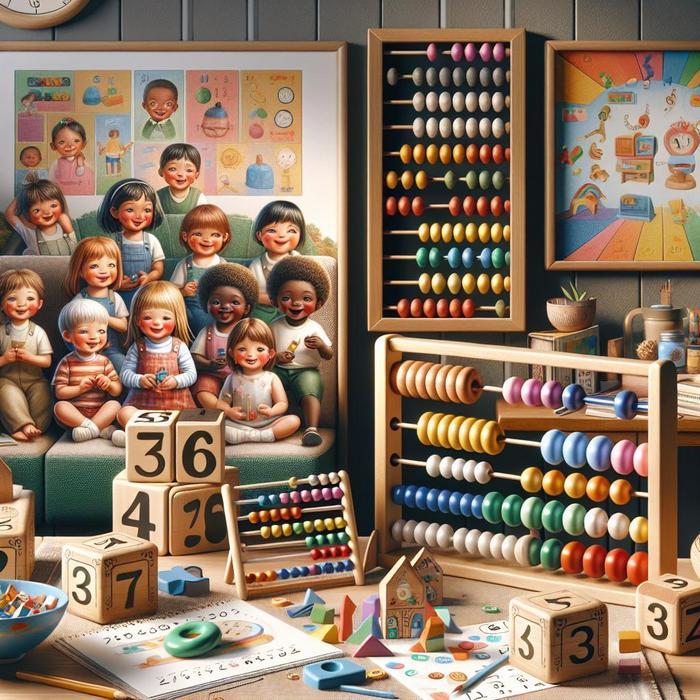Unpacking the Importance of Early Math Concepts
When it comes to the early development of our children, we often pay more attention to developing their language and reading abilities. However, the significance of introducing early math concepts is often undervalued. Did you know that a child’s math skills at kindergarten entry can be a strong predictor of their future academic success? Yes, you read that right!
Early math is not about doing sums and memorizing tables, but more about games and patterns. Let’s explore how you can help your toddler get a head start with these fun and educational games and counting activities.
Making Math Fun with Educational Games
For young children, play is the key to learning. Transforming math into a playful and engaging activity can make it less daunting and more fun. By incorporating educational games into your child’s routine, you can introduce early math concepts in an enthralling way.
- Sorting: Sorting and categorizing objects based on colors, shapes, sizes etc. is a fundamental math skill. You can start with simple items like toys, fruits, socks and gradually move to more complex objects.
- Building: Lego blocks or building towers with cubes can enhance spatial awareness. Counting the blocks as they stack them up can also improve their counting abilities.
- Board Games: Games that involve counting or moving spaces, like Snakes and Ladders, can encourage the understanding of numbers and counting.
Counting Activities: Introducing Numbers with Fun
Learning to count is one of the earliest math skills a child develops. It’s much more than just reciting the numbers. It’s about understanding the concept of ‘how many.’ Here are a few hands-on counting activities to jumpstart your toddler’s math journey.
- Using Candy Hearts: Nothing gets a kid’s attention like candy. Turning sweet treats into a math lesson can make learning numbers fun and interactive. Check out this activity to understand how.
- Finger Counting: Use your fingers to teach your child to count. It’s a great way to visually represent numbers and improve their number sense.
- Math Story Books: Books that incorporate numbers or counting can create a meaningful context for introducing numbers.
Want more insights on early math skills? Here’s a reflection on early math experiences that you might find useful.
Aiding Learning with the Right Tools
Incorporating the right learning tools can make a world of difference in a child’s learning journey. At Mom-Bottles.com, we have compiled a list of tried-and-tested baby gates for secure indoor play, as well as useful tips for managing breastfeeding on the go.
Encourage Active Learning with Cooking
One fantastic way to incorporate learning and fun is by bringing the math into the kitchen. Children have a natural curiosity about cooking and baking, making it an excellent opportunity to introduce math concepts like counting, measuring, and fractions. For instance, let them help measure ingredients for a recipe or count fruit slices. It can even involve subtraction if they eat a few bites! For more math-enhanced cooking activities, head over to Zero to Three.
Outdoors Math Learning
Who said math learning is confined to indoors? Bring math concepts to life by involving your child in outdoor activities. Collect leaves, measure rain in a cup, count the birds in the park – the possibilities are endless! Incorporate number rocks in a sandbox or chalk numbers on the sidewalk. Have a peek at Busy Toddler for more exciting outdoor math ideas.
Utilizing Math-centric Games and Toys
Introducing games and toys that foster mathematical thinking can be highly beneficial. Simple games like Dominos, Memory, and Candy Land can boost number sense, counting, and strategic thinking. Puzzles and shape sorters can also help enhance spatial reasoning and problem-solving abilities. Browse through some amazing Math Activities for Preschoolers at Doodle Learning.
Blending Math and Story-telling
Interweaving math concepts into story-time can be an excellent way to make numbers more appealing. Stories can put math in context and make it easier for toddlers to comprehend. On that note, check out Adventures in Storytime for ways to incorporate math into literacy activities.
Apps and Digital Platforms for Math Skills
Today’s digital age offers numerous apps and online resources that can make math learning interactive and exciting. From basic number recognition to advanced mathematical operations, there is an app for everything. But remember, screen-time should always be monitored and limited.
In conclusion, remember that every child is unique and may respond differently to various teaching methods. The idea is not to make your child a math genius overnight but to raise them with a ‘can-do’ attitude towards math, thus ensuring lifelong success.
Unleash Creativity with Math-art!
Math and art may seem like a surprising combination, but they go hand in hand. Mathematical concepts form the backbone of art, be it symmetry in designs or patterns in weaving. Encourage your child to create art using geometric shapes, or dip leaves in paint and press onto paper for a fun, pattern-oriented activity.
Fostering an early love for math in your child will set the stage for greater academic success, better problem-solving skills, and a deeper understanding of the world around them. Let’s make math fun together!

